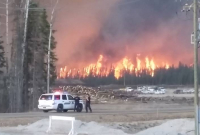Support strong Canadian climate journalism for 2025
The Red Cross is providing an immediate payment of $50 million to evacuees of the Fort McMurray forest fire.
CEO Conrad Sauve says each adult is to receive $600 and each child will get $300.
Sauve says the money is to be electronically transferred to evacuees within the next two days.
"This is the most important cash transfer we have done in our history and the fastest one," he said Wednesday at a news conference in Edmonton with Alberta Premier Rachel Notley.
"(It’s) a combination of both the ability to raise money very fast in Canada and also use electronic means to transfer money directly into the hands of those affected."
Everyone has unique needs and giving evacuees cash lets them decide how best to spend the money, Sauve said.
"We know already that the damage resulting from the wildfire will be in the billions and it will take years to recover. But we also know that the needs of those affected are immediate."
Sauve said $67 million has so far been donated to the Red Cross and much of that will be matched by the provincial and federal governments.
Notley reminded people that the Alberta government is also providing immediate monetary assistance. Debit cards are being handed out at evacuee centres and other locations across the province.
Every adult evacuee is to receive $1,250 and each dependent $500.
"Our aim is to get help to the evacuees who need it the most as quickly as possible," she said. "There will be long lineups, especially in the early days of distribution, so I am asking all evacuees if you don’t need emergency funding immediately, please let those in desperate need be first in line."
The government anticipates the emergency funding will cost up to $100 million. The province is also matching donations made by Albertans to the Red Cross.
Notley didn’t have an update on when Fort McMurray residents may be able to go back. On Monday, after touring the city by ground, she said a schedule would be out in about two weeks.
"I understand it’s hard for people not to have a definitive timeline," she said. "But at the same time, I don’t want to give them a definitive timeline, have them build their hopes around that ... and then discover an infrastructure deficit that we didn’t previously know about that delays things by a week or two."




Comments